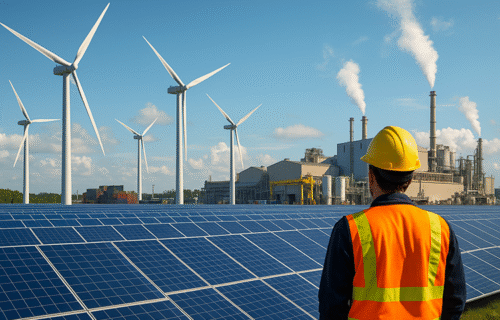Europe’s transition to a low-carbon economy hinges on its ability to integrate small and medium-sized enterprises (SMEs) into the fast-growing cleantech manufacturing sector, according to a new study released by the Organisation for Economic Co-operation and Development (OECD). The report, “The Evolution of Cleantech Manufacturing: Implications for FDI and SME Linkages Across Europe,” highlights that while foreign direct investment (FDI) in green industries has accelerated, the benefits remain concentrated in a limited number of countries and industrial clusters.
The OECD’s findings show that global investment in clean technology manufacturing expanded more than tenfold between 2016 and 2023, rising from around USD 13 billion to USD 134 billion. Much of this growth has been driven by the rapid build-out of battery production facilities, with major gigafactories emerging across Europe, Asia and North America. Europe continues to lead in wind-energy technology, attracting roughly one-quarter of global investment in the sector, yet it remains heavily dependent on imports in other areas. More than 90 percent of solar panels installed within the European Union are still sourced from Asia, particularly China, according to analyses by both the European Commission and the think tank Bruegel.
Although SMEs represent about 95 percent of companies involved in cleantech-related industries, their role in exports and high-value manufacturing remains limited. The OECD notes that smaller firms tend to occupy early stages of production—such as materials, components and recycling—rather than the final assembly of complete systems. Without stronger access to financing, skilled labour and international partnerships, many could remain on the margins of Europe’s industrial transformation. The World Bank’s research on Central and Eastern Europe supports this view, estimating that SME participation in green exports could triple if governments strengthen investment incentives and reduce administrative barriers.
The OECD report underlines the need for better coordination between national investment strategies and EU-level industrial policy. Initiatives such as the Net-Zero Industry Act and Critical Raw Materials Act are already aimed at fostering manufacturing capacity and reducing dependence on imports, yet implementation across member states has been uneven. The European Central Bank has similarly warned that Europe’s green transition will require unprecedented levels of financing, urging policymakers to close the investment gap through public support and private-sector mobilisation. The ECB’s latest economic bulletin cites skills shortages, regulatory complexity and lengthy permitting procedures as major obstacles to scaling up green manufacturing.
Bruegel analysts have echoed these concerns, arguing that Europe’s industrial policy must strike a balance between environmental ambition and global competitiveness. Without a more predictable and coordinated regulatory framework, investors could continue favouring countries with clearer approval procedures and faster project delivery.
Looking ahead, the OECD study presents several possible trajectories for the evolution of cleantech value chains depending on global cooperation and sustainability efforts. In its more optimistic outlook, Europe could develop robust, interconnected regional ecosystems that link international investors with local innovators. In a less favourable scenario, persistent import dependence and fragmented policymaking could widen disparities between advanced and lagging regions.
The coming years will be decisive for Europe’s industrial transformation. As EU recovery and climate funds continue to be channelled into manufacturing and technology upgrades, policymakers face the challenge of ensuring that new investment supports both decarbonisation goals and balanced regional growth. As one OECD policy expert observed, “The direction of investment is clear. What matters now is whether Europe’s smaller firms and regions can capture a fair share of this momentum.”
